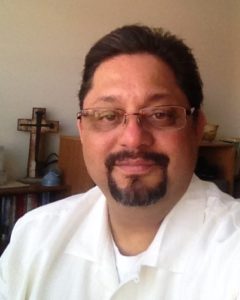 Sent 2016: A gathering of Mennonites planting Jesus-centered communities, was the first gathering of Anabaptist-Mennonite church planters of its kind. Mennonite Church USA and Mennonite Mission Network brought together church planters, groups testing the call, pastors, missiologists and conference leaders March 31-April 2, to explore approaches, best practices and the variety of perspectives that exist on church planting through an Anabaptist lens. This is the final post in our series from participants in Sent 2016.
Sent 2016: A gathering of Mennonites planting Jesus-centered communities, was the first gathering of Anabaptist-Mennonite church planters of its kind. Mennonite Church USA and Mennonite Mission Network brought together church planters, groups testing the call, pastors, missiologists and conference leaders March 31-April 2, to explore approaches, best practices and the variety of perspectives that exist on church planting through an Anabaptist lens. This is the final post in our series from participants in Sent 2016.
Byron Pellecer was born in Guatemala City where he began his faith journey in a local Mennonite church. His passions are lead pastoring, church planting and leadership development. He is the associate conference minister for Western District Conference in Texas.
In a panoramic view of the Gospels, as we read about Jesus, we will notice that connecting with people, teaching them the word of God and teaching them to pray was his common approach and practice. Such building and connecting and teaching allowed people to be responsive to Jesus’ ministry.
When starting any church plant effort in a given location, after much prayer and discernment, it is our practice to move in and live within the community that we attempt to reach, evangelize and disciple.
It is not a prescriptive approach rather, it is a learning experience while journeying together. And we both, the community and the church planter, experience transformation in many ways.
In this incarnational approach, the idea is to interact, connect and build relationships based on mutual trust with our barrio-neighborhood and immediate community. Overall, what we seek is to become friends with them. Our approach is influenced by the understanding that we, the church planters, are their guest and that they, the neighborhood, are our hosting community. Our firm belief is that God is already there working in this community and that he has invited us to be part of his mission.
On the other hand, I am aware that there many ways of understanding and practicing church planting.
I have planted churches within three area conference of Mennonite Church USA: Southeast, Virginia and Western District, and each geographical and demographic context is totally different.
However, they all have one thing in common. The kingdom of God was already there transforming people’s lives and calling them to enter into his kingdom.
The Spirit of Christ was already among this people, convicting and transforming them in many ways. Part of my challenges have been to be attentive to his voice and movement. Consequently, church planting it is not about the church planter, the church itself or the sending body. It is all about the kingdom of God!
There are plenty of ways, strategies and models when approaching church planting. However, such approaches must respond to a given and specific context. They do not happen in the void, context itself does matter.
There is no one-size-fits-all model in church planting.
So, when considering joining God’s mission through church planting, listening to the Spirit and allowing him to guide us is the best approach. That is to say that we need Holy Spirit power. “But you will receive power when the Holy Spirit comes upon you. And you will be my witnesses, telling people about me everywhere—in Jerusalem, throughout Judea, in Samaria, and to the ends of the earth” (Acts 1:8 NLT).
It is within this frame work and expectation that I wanted to approach and participate at the SENT 2016. I wanted  to hear, learn and experience what the Spirit is doing in the midst of our Mennonite Church USA area conferences, church agencies and through fellow church planters!
to hear, learn and experience what the Spirit is doing in the midst of our Mennonite Church USA area conferences, church agencies and through fellow church planters!
The very idea that a summit of this caliber was even happening excited me beyond imagination. My heart and soul were filled with hope and expectations.
The outlined program, the keynote speaker and workshop facilitators provided a living proof of God’s presence amid this event. In addition, it was through the workshops of others and my own, general assemblies and personal conversation, that I was able to fulfill some of my expectations. I got a taste of the Spirit at work in different contexts and throughout time, those who did church planting in the past, those doing it now and of those who are in the discerning process of doing in the future.
I had a few conversations with several other church planters. They were among the attendees, whether as resource people or as participants. My personal conversation with them was around the Missio Dei, discipleship and house church planting networks. These conversations were shaped from our understanding and practice of the Great Commission.
I presented on the centrality of Jesus’ authority and his obedience to God the Father. My personal remarks centered on the fact that Jesus’ authority is the same as that of the God’s. It is with such authority that he is in a unique and distinctive position to call and commission his disciples and the Church.
As we navigate through the assertion of Jesus’ commission to “go therefore and make disciples of all nations” (Matthew 28:19), we are challenged that the commission was not given to us as an option or as a suggestion. It was commanded of us.
His pronouncement is followed by baptism and the provision of instruction about his commands. Baptism is the external sign of confession of an internal conviction. It is also known as the rite of incorporation into the Body of Christ.
In summary, it seems clearly that Jesus’ instruction to his disciples was and still is to expand their circle of their “circle of trust” by building relationship with their immediate community and abroad. Jesus’ message is still the same, repent and enter the kingdom of God.
The church is intended to be a universal and culturally diverse community, comprising people from all nations, tribes and languages.
As the disciples pursue their mission, they do so with the assurance Jesus offers at the end of his pronouncement: “I am with you always” (Matthew 28:20). This is an unconditional promise! The purpose is to connect with people, build relationships and create a network that will allow us to share Christ’s story.

